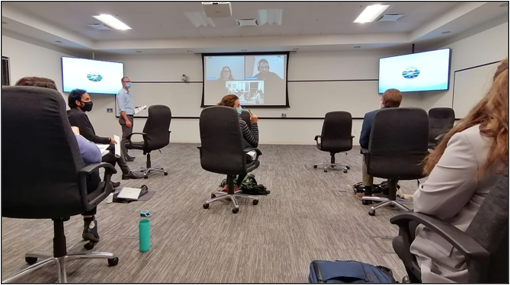Stormwater drainage conference helps connect SCCWRP to researchers worldwide

SCCWRP hosted an international engineering conference focused on improving modeling of urban stormwater drainage systems over a three-day period in January that attracted 146 researchers and practitioners – more than half from outside the United States.
The 12th Urban Drainage Modeling Conference, which was held for only the second time ever in the U.S. since it began in 1986, provided a forum for engineers, scientists and others to advance the modeling work that underlies many routine stormwater planning and permitting activities, including implementation of stormwater BMPs (best management practices).
SCCWRP’s selection as the conference’s host helped raise the agency’s profile within this international research community as a leader in improving management of wet- and dry-weather runoff. SCCWRP made stormwater BMPs one of its eight major thematic research areas in 2019 to underscore the agency’s commitment to visionary, forward-looking research in this field.
SCWRP was selected to host the conference by the International Working Group on Data and Models, a subcommittee of the Joint Committee on Urban Drainage. The international organization works to emphasize and promote effective interactions between experts in hydraulics, hydrology, and water quality.
About 20 participants from five countries attended in person at SCCWRP, adhering to strict COVID-19 protocols; the remainder participated remotely through a hybrid online/in-person format.
About 50 participants hailed from Europe, five from developing countries, and a handful from Japan, Taiwan and Australia. Nine projects involving SCCWRP member agencies were presented.
Among the conference’s highlights were two workshop sessions on the use and advancement of open-source modeling tools like the U.S. Environmental Protection Agency’s Storm Water Management Model (SWMM). Participants agreed that stormwater researchers’ shift towards open-source modeling tools has been a strategically important advance that has enabled more efficient implementation and progress across the field.
SCCWRP and its member agencies already have been investing in high-quality, open-source tools and approaches as a foundation for improving standardization of data collection and reporting methods, as well as for building regionally compatible data sets.
For example, SCCWRP is working with the Southern California Stormwater Monitoring Coalition to build a regional BMP monitoring network for measuring and tracking the performance of a wide variety of stormwater BMPs. Key to the network’s success will be development of standardized collection and reporting methods that enable multiple participating agencies to generate high-quality, comparable data sets, as well as to leverage results to increase statistical confidence in quantitative conclusions.
SCCWRP Commissioner Mark Gold from the California Ocean Protection Council served as the opening keynote speaker during the conference; he urged conference attendees to consider the wide variety of managerially relevant research needs they can help fill, including improved understanding of stormwater/groundwater interactions, changes in hydrology due to wildfires and climate change, the link between stormwater runoff and management of ocean water quality, and availability of data to support models.
Video recordings of at least some of the talks are expected to be posted publicly to the conference’s website in the coming weeks. A full list of the 74 oral conference presentations and 19 posters, including abstracts for the talks, already is publicly accessible on the conference website.
For more information, contact Dr. Elizabeth Fassman-Beck.
More news related to: Runoff Water Quality, Southern California Stormwater Monitoring Coalition, Stormwater BMPs, Top News